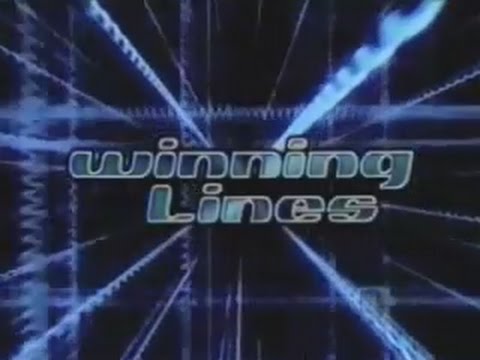|
And, now, the biggest game show to ever hit primetime…
 SHOW:
Winning Lines SHOW:
Winning Lines
AIR DATES: January 8 to February 18, 2000
CREATOR: David Briggs, Mike Whitehill, Steve Knight
PACKAGER: Stone-Stanley Entertainment/Celador
HOST: Dick Clark
WATCH IT HERE: YouTube
You know that Dick Clark is, essentially, a game show deity. He may have hosted some relative bombs like "Scattergories", "The Challengers" and the first version of "The Krypton Factor" but his lo-o-o-o-ong run as host of "The $??,000 Pyramid" more than made up for it. PLUS he produced other games like "Mad Libs", "So You Think You Can Dance?" and..."The Chamber". OK, so maybe he was better at variety shows like "American Bandstand" and "Bloopers & Practical Jokes"...but the World's Oldest Teenager decided he had one more hosting gig left in him before sticking to hosting New Year's from Times Square. Enter CBS' shot at dethroning "Millionaire": "Winning Lines"...which was not only based on a UK show like "Millionaire" but was also produced by the SAME STUDIO. Guess they figured that if it could make ONE hit primetime million dollar game show, it could make another. But they changed it rather heavily from the UK version and, while still quite interesting, maybe it WASN'T such a hot idea to do it as a half-hour show.
HOW WAS IT PLAYED?
MAIN GAMEPLAY
49 contestants start the game. Each sits in a large set, each designated a number between 01 and 49.
FIRST ROUND
Six questions with numerical answers are asked. The contestants have five seconds to input their answer to each question and lock it in. The contestant who answers the question right in the fastest time (like "Fastest Fingers" in "Millionaire") wins $1000 and advances to the second round. This continues until six contestants advance. The other 43 get parting gifts.
SECOND ROUND ("SUDDEN DEATH")
The six contestants have their designated numbers still attached to them. The host then asks questions, each one with an answer that is one of the contestants' numbers. The contestants buzz-in to try to give the right answer. If the one who buzzed in first gets it right and the answer is THEIR number, no one is eliminated. If the one who buzzed in first gets it right and it's someone else's number, the one with that number is eliminated. A contestant with a wrong answer is eliminated no matter which number it is. If NO one buzzes in, the number of the correct answer is eliminated. This continues until only one contestant remains; they get their score augmented to $2500 and they advance to the bonus round while the other five keep their $1000 apiece.
BONUS ROUND ("WONDERWALL")
The winner is shown three large screens - the titular "Wonderwall" - covered with 49 numbers paired with 49 possible answers. They are given 15 seconds to peruse the answers before the three-minute game clock begins. The host then starts asking questions and the winner has 15 seconds to give not just the correct answer but must precede the answer with the number paired with it on the Wonderwall. The winner has a button in their hand which activates one of two 15-second "Pit-Stops", stopping the game clock and allowing them to look at the wall for a little longer (they cannot answer DURING the "Pit Stop"). They may pass on any two questions they wish. For each correct answer they get, they move up a money ladder starting at $2500 and ending at $1,000,000. If they answer 20 questions before the game clock hits "0:00", they leave with $1 million.
If the winner answers a question wrong or take more than 15 seconds to answer, they get a strike. If they get three strikes or the game clock hits "0:00", the game ends and they leave only with the $2500. When they get two strikes or they get down to fifteen seconds on the game clock, a big red button glows. This "Bail Out" button could be hit at any time it glows up to the player getting a third strike or running out of time. Hitting the Bail Out button ends the game and the winner leaves with the money they've reached on the ladder.
During the show, the ones digits of the six contestants who advanced to the second round and the ones digit of the last correct answer given on the Wonderwall are collected and, if it matched a home or cell phone number of a viewer, they can call a toll-free number to win $50,000.
WHAT WORKED?
Well, the set was pretty good for being a mockup of the UK version. All that neon was very 80s and 90s but it served its purpose in this show to try to make it LOOK exciting. Hate to be the guys having to climb up to the sixth tier, though; made a sort of precursor of "1 vs. 100", didn't it?
As always, Dick Clark was great. Almost always smiling, moved the show along at a steady clip, laughed at how happy the winners were and even shared in their excitement. After the first Wonderwall when someone just BARELY held on to $500,000, Dick said that HE was all but biting his nails in hoping the winner would hit that button before time ran out. He would host two one-day special shows for FOX before calling it a hosting career...but being as excited as the ones actually WINNING the money? That takes someone special.
WHAT DIDN'T WORK?
While the format followed the UK's almost exactly, I can't quite grok how it remained popular there. Let's face it: while interesting and unique, the first two rounds were relatively boring. And the fact that so many contestants left with squat didn't really endear it in the US, I'm sure. To start with 49 and pare down to 6 in just the first few minutes seemed a bit unfair to us, I'm sure.
And the fact that it was a half-hour show in a time when big-money shows needed to be at LEAST one hour long meant the show seemed a bit rushed by our standards. Yes, the UK show was just as long but...I guess we got used to contestants taking their time becoming millionaires.
While Wonderwall was a saving grace for the show, it made people (myself included) wonder why it wasn't the entire show. They could've had three contestants each try out the Wonderwall instead of getting 48 hopes up. And the UK version was just two "Pit Stop"s and no "three strikes" or the like; the US overcomplicated the game. The only up side to the US version is that it offered big money instead of trips...though working your way up from London to "Around the World" is kinda cool, I must say.
WOULD IT WORK TODAY?
Again, a GSN or Buzzr revival with less cash and the 43 who blew the first round allowed to stick around until they advanced or lost five straight might work. The show IS interesting at first but, if they can't spruce it up one way or another, they might as well let it stand as Mr. Clark's last stand. And, while it was embarrassingly short, at least he did it with the aplomb we've know him for all these years.
NEXT TIME: It's a mob in here...
Chris Wolvie tried some "winning lines" last night...and the women nearly slapped his teeth out. Follow him on Twitter @ChrisWolvie and e-mail him at chriswolvie@yahoo.com. |


